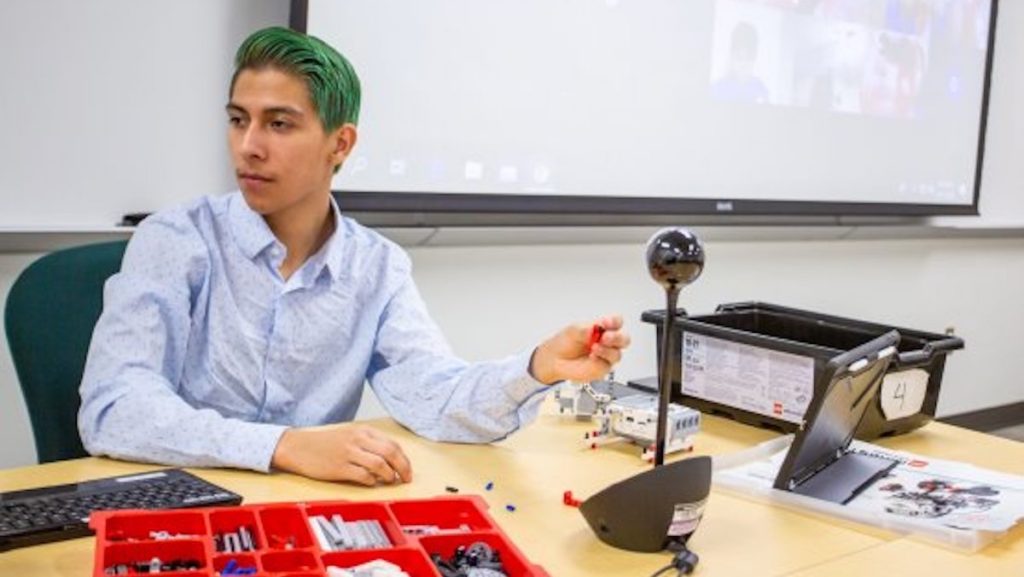
Texas Border Business
McALLEN, TEXAS – From braiding bracelets to coding and controlling a robotic LEGO arm. From lacquering pinecone bird feeders to launching an Arduino LED display. It would seem that summer camp arts and crafts have come a long way.
Thanks to a partnership between South Texas College and La Joya Independent School District, elementary and middle school students are building more than just character at camp these days. They’re building robots.
“[It] was fun and exciting,” says Yulissa Lumbreras, fourth grader at Emiliano Zapata Elementary School and three-year veteran of STC’s seasonal camp. “Robotics camp inspired me to help the environment … For example, to build a robot to help in the area of recycling.”
For the first time in South Texas, young students like Lumbreras are getting an early glimpse of high-tech opportunities in advanced manufacturing and robotics. This week, 96 local students will answer the Spring Robotics and Automation Camp roll call virtually, as STC launches year 6 of its groundbreaking K-12 outreach effort. With the health crisis limiting in-person access, campers are connecting to the curriculum remotely, using program-provided LEGO Mindstorms EV3 kits to follow along with hands-on projects from home.
Six years into the CTE-focused endeavor, the camps are “an overwhelming success and having a positive impact on the students and parents,” says Carlos Martinez, Training Specialist in the Advanced Manufacturing department.
The young participants don’t tend to require much reprogramming. Robotics and automation were already important, if undiscovered, concepts in many of the high-tech toys that first piqued their interest in CTE. And while for some, the camp experience may represent the first real spark of inspiration toward a STEM pathway, for others, it’s a wake-up call to the career possibilities behind the toys and technology they love.
After all, once you’ve designed, built and controlled a real robot, it’s tough to go back to tetherball.
“We believe early exposure to these opportunities can help influence the educational and life paths of our students and foster a love for CTE,” says Avelina Pena-Segovia, Advanced Academic Strategist at LJISD.
For Pena-Segovia, the robotics and automation training camps are “an attempt to give this population of students an exposure to new opportunities,” putting them on a bold path to a high-tech, high-demand career.
“[They] give a maximum amount of exposure to our students,” says the coordinator. “That will, hopefully, help shape their future endeavors.”
The seasonal camps went virtual in summer 2020, after five years on-site at STC’s Institute for Advanced Manufacturing (IAM). Even without access to the department’s cutting-edge facilities, students managed to achieve the same objectives at home.
The effort represented a first in the state of Texas, “and maybe the world,” says Martinez. The camps served four cohorts, affording 25 hours of robotics training each on LEGO EV3 kits mailed ahead of time by the College. The virtual version was such a success that STC and LJISD conjured an identical program for the fall semester, delivering a one-of-a-kind experience to an additional 86 students.
“It is imperative that our children get familiar with these advancements so they can have opportunities to contribute to later developments,” says Aaron Lumbreras, science teacher at Elodia R. Chapa Elementary and father of tech-happy camper Yulissa. “La Joya ISD and STC provide that introduction to automation/robotics needed for our young children.”
Inspired by a conversation with a robot-obsessed second-grader, STC’s seasonal training camps were the brainchild of Associate Dean Dr. Carlos Margo, who saw an opportunity to leverage the College’s high-tech resources to support a broader effort to highlight regional CTE. At the time, the Robotics and Automation lab at South Texas College represented a technological wonderland to students previously unexposed to advanced manufacturing, and thanks to a $314,150 grant in 2020, opportunities have only expanded. Today, campers have access to the same industry-standard equipment used by college students, including Fuji Automatic Numerical Control (FANUC) robots, cyber-physical inspection equipment, and a forklift simulator.
“We had the resources, the labs and the equipment, and it just took off from there,” says Margo.
And while the camp’s focus is always on fun, there’s also an emphasis on career readiness, with industry-experienced instructors making constant connections between the projects and real-life opportunities. Since 2018, the training camps have diversified, branching into high-demand sectors like drone piloting, airplane piloting, Festo bionics, 3-D printing and more.
Meanwhile, attendance has ballooned, with more than 600 3rd-8th graders slated to take part either face-to-face or virtually in 2021. All told, more than 2,500 future tech professionals from La Joya ISD have benefitted from the STC experience since the project’s launch.
“We have it in our power to coordinate and execute these types of camps and we will continue to do so,” promises Pena-Segovia. “For me, it is confirmation that I am doing my job and that I am serving my population of students well.”
For program administrators, the training camps have only strengthened the alliance between La Joya Independent School District’s 42 K-12 institutions and STC. The idea, suggests Martinez, is that campers will have not only learned about the existence of career pathways in robotics and automation, but will already effectively be on the path.
“Today’s strong partnership with La Joya ISD has been developed thanks to the quality of service from the planning through the execution of each camp,” says the trainer.
The timing of the partnership couldn’t be better. The camps are growing right along with the regional advanced manufacturing and tech industries, providing early access to STEM pathways traditionally reserved for high school or even college. According to administrators, the pandemic has only increased urgency in these sectors, and for those looking to start earning a living right out of high school, that early foundation in career education can be a game-changer.
Currently, an entry-level robotics or electromechanical technician can bring in more than $50,000 annually in Texas, with higher-level engineers regularly earning six figures. With multiple degree and certificate options available through its vaunted Advanced Manufacturing department, South Texas College is dedicated to bridging the gap between camp and career.
For parents like Lumbreras, opportunities like robotics camps are a key component in raising CTE-savvy students, “not only age-wise but to grow with their learning experiences throughout” their developmental years.
“I foresee my daughter to soon be a part of the STEM campuses and competing in those water robotics competitions,” predicts the future-focused parent educator. “Her interest is extremely high as she continues to experience more opportunities each year due to the partnership of STC and LJISD.”Learn more about STC’s cutting-edge Institute of Advanced Manufacturing at southtexascollege.edu/manufacturing.













